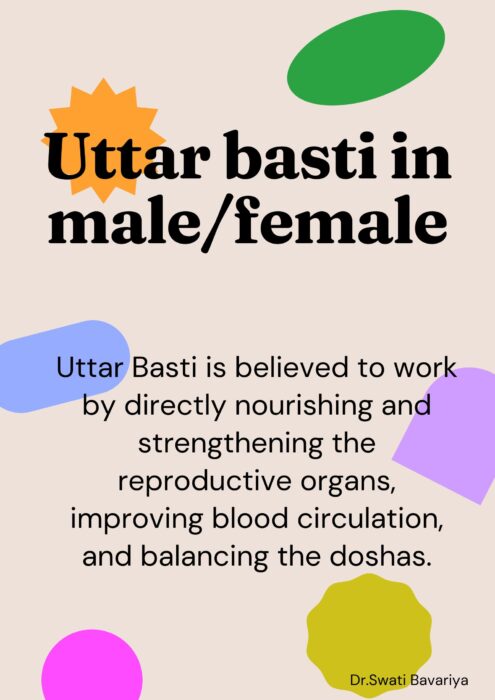Uttar basti, also known as Uttara Vasti, is a specialized Ayurvedic treatment that involves administering medicated oils or Ghrita into the urinary bladder or uterus through the urethra or vaginal canal, respectively. It is a part of the Ayurvedic therapy known as Basti, which refers to enemas or localized treatments using herbal oils or liquids.
Uttar basti is commonly used to address disorders of the urinary system, reproductive system, and certain gynaecological conditions. It is particularly beneficial for conditions such as urinary tract infections, urinary retention, urinary incontinence, endometriosis, infertility, and certain menstrual disorders.
Here’s a general overview of the procedure:
- Preparation: Before undergoing Uttar basti, the individual may undergo a preparatory phase called Snehana, which involves internal and external oil massage using medicated oils or ghee. This helps to lubricate the tissues and facilitate the passage of the enema.
- Positioning: The person receiving Uttar basti is positioned in a specific manner, either lying down or in a modified lithotomy position, to allow access to the urethra or vaginal canal.
- Catheterization: A specialized catheter or a device called a Vasti Yantra is used to introduce the medicated oil or decoction into the urinary bladder or uterus. The catheter is carefully inserted through the urethra or vaginal canal, respectively.
- Administration of Medication: Once the catheter is in place, the medicated oil or ghrita is slowly and gently introduced into the bladder or uterus. The quantity and temperature of the medication are determined based on the individual’s condition and the practitioner’s expertise.
- Retention and Drainage: After the medication is administered, the person is advised to retain it for a specific duration, allowing the therapeutic properties of the oils or Ghrita to take effect. The practitioner may guide the individual on proper breathing techniques and relaxation during this time.
- Post-treatment Care: Following Uttar basti, the individual may be given specific dietary recommendations and herbal medicines to support the healing process and maintain the balance of the doshas.

